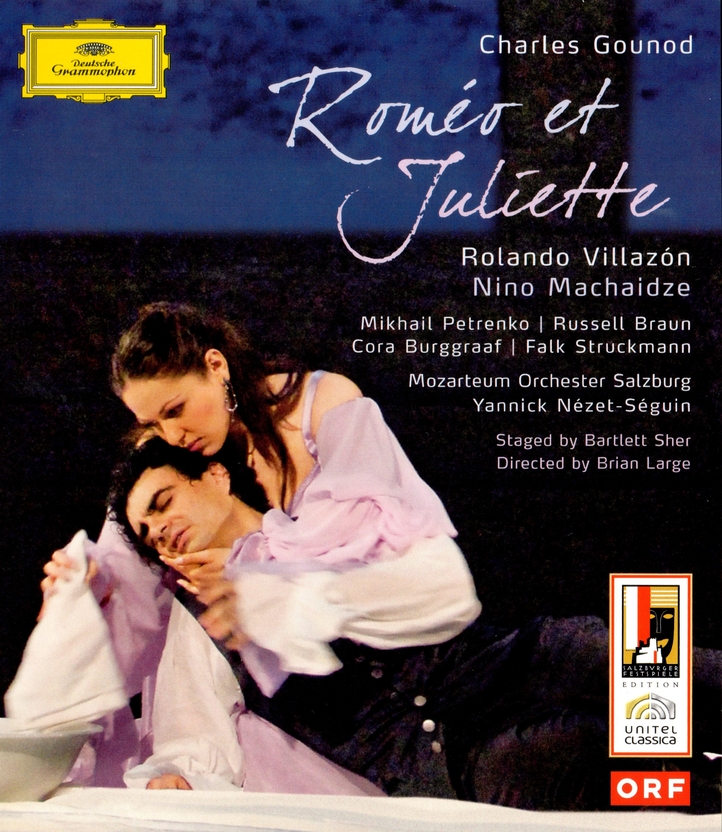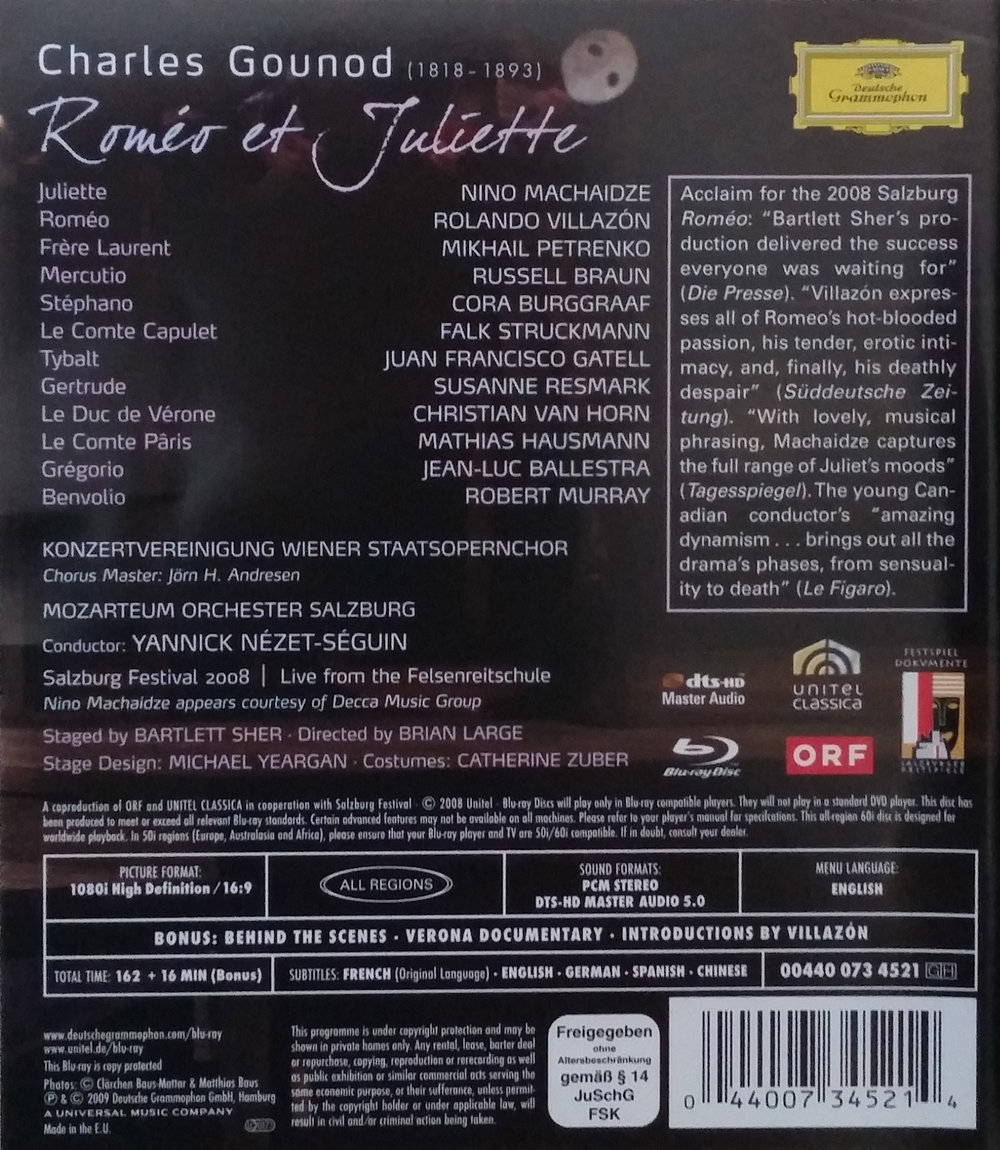

Charles Gounod Roméo et Juliette opera to libretto by Jules Barbier & Michel Carré. Directed 2008 by Bartlett Sher at the Salzburg Festival. Stars Nino Machaidze (Juliette), Rolando Villazón (Roméo), Mikhail Petrenko (Frère Laurent), Russell Braun (Mercutio), Cora Burggraaf (Stéphano), Falk Struckmann (Comte Capulet), Juan Francisco Gatell (Tybalt), Susanne Resmark (Gertrude, the Nurse), Christian Van Horn (Duc de Vérone), Mathias Hausmann (Comte Pâris), Jean-Luc Ballestra (Grégorio), and Robert Murray (Benvolio). Yannick Nézet-Séguin conducts the Mozarteum Orchester Salzburg and the Konzertvereinigung Wiener Staatsopernchor (Chorus Master Jörn H. Andresen). Musical Assistant was Leo Hussain; set design by Michael Yeargan; costumes by Catherine Zuber; lighting by Jennifer Tipton; choreography by Chase Brock; fight scene by B. H. Barry. Directed for TV by Brian Large. Sung in French. Released 2009, disc has 5.0 dts-HD Master Audio sound. Grade: B+
According to The Grove Book of Operas, many composers have written operas based on Shakespeare's Romeo and Juliet, but Gounod's version is the only one that's now being performed. It came later than the era of French grand opera, but it's in five acts and gives the director plenty of opportunity to sate with audience with lavish costumes, magnificent sets, and a huge chorus. But to do that, you have to be in a real opera house with all the facilities for quickly changing scenery and props.
The Felsenreitschule (The Clift Riding School) venue in Salzburg, where this was produced, is a combination of an outdoor arena and a huge barn. It doesn't have what's needed to put on a grand show. The lighting at the Felsenreitschule isn't the greatest either, and the stage tends to be dark. But at least the venue is relatively small. Everybody, including the audience, does the best they can.
Bartlett Sher had a great cast to work with including Nino Machaidze, a young and beautiful Juliette specialist (singing in French) and Rolando Villazón as Roméo. They spent plenty on costumes, and the opera opens with the Capulet party where Juliette is to meet the Comte Pâris, who has declared his interest in marrying her. Our first screenshot depicts the party. This is the only long-range shot I have in this review. The great videographer Brian Large shot this. With the low light, drab set, and great costumes, he elected to move in and shoot mostly near-range and close-ups. This works great in the HT:
On the left is Le Comte Pâris (Mathias Hausmann) with Tybalt (Juan Francisco Gatell), Juliette's cousin. Tybalt is the leading young man in the Capulet clan. The main theme in his opera is, of course, the love between Roméo and Juliette. The second theme is the hatred that the aggressive Tybalt has for Roméo because Roméo is of the House of Montaigu. Gatell doesn't get to sing all that much in this libretto, but he gets plenty of action:
Juliette's father (Falk Struckmann):
Roméo (Rolando Villazón) crashes the party. He and Juliette meet and instantly both fall in love at first sight. The text of the initial courtship follows Shakespeare well, but the kissing is contributed I think by Director Sher:
Juliette isn't with Roméo all that long, but Tybalt notices right away that the party is not going as planned:
Roméo is shocked to learn that the beautiful girl is the Capulet Princess. Already he's trying to ingratiate himself with Tybalt:
But Tybalt recognizes Roméo's voice:
Tybalt is not remotely able to grasp what has happened:
Both the libretto and the music in this opera start off awkwardly. But once it's love at first sight, the opera catches on fire with incredibly beautiful solos and duets for the lovers:
Juliette asks Roméo for marriage:
Gounod gives Frère Laurent a deeply affecting bass part in the wedding scene:
Tybalt closes in on Roméo. Roméo, now married to Juilette, tries to pour oil on the waters:
Tybalt has fatally wounded Mercutio:
The death of Tybalt, cut down by Roméo:
Frère Laurent tries to help the newly-weds to flee:
But Roméo doesn't get the word:
The Brian Large video is absorbing in the HT. You can also tell, especially during the curtain calls, how enthusiastic the live audience in Salzburg was about the singing and the orchestra. This was an A quality performance, but I have to mark it down for the weak mise-en-scène to a B+.



















